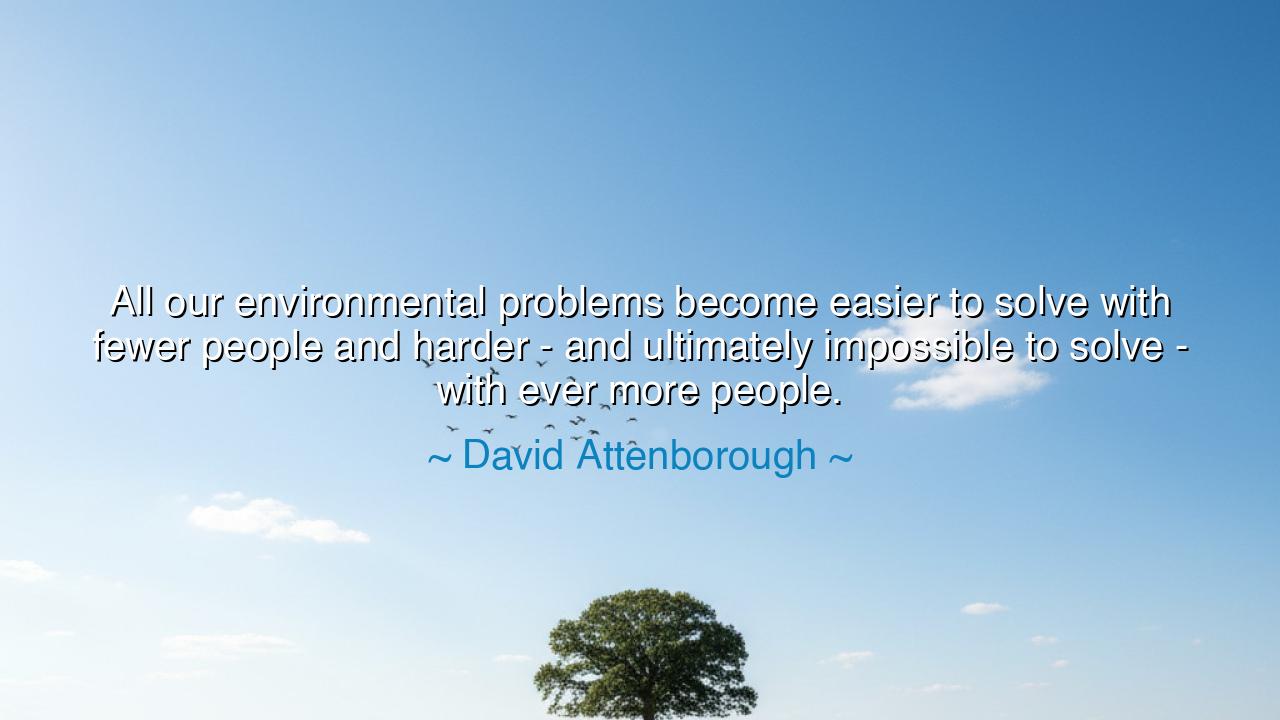
All our environmental problems become easier to solve with fewer
All our environmental problems become easier to solve with fewer people and harder - and ultimately impossible to solve - with ever more people.






In the councils of wisdom, the elders taught that every vessel has its measure, every pasture its pasture-load, every hearth its proper flame. Sir David Attenborough’s warning—“All our environmental problems become easier to solve with fewer people and harder—and ultimately impossible to solve—with ever more people”—is a restatement of that ancient law of limits. It is not a curse upon humanity; it is a call to harmony, a reminder that the bowl must fit the rice, the river the boats, the forest the fires. When our numbers and appetites outrun the land’s carrying capacity, the earth’s answers grow thin.
The image is simple: imagine a well in a dry season. With fewer people, the water rises for all; disputes quiet; the bucket returns heavy. With ever more people, each draw lowers the level; quarrels kindle; mud answers where water once spoke. So it is with soil and sea, with air and ore: the more mouths to feed and furnaces to stoke, the more every remedy grows harder—more costly, more complex, more fragile—until at last some tasks turn impossible, not for lack of cleverness, but for lack of room, time, and living tissue left to heal.
Consider a historical parable from the world’s far edge: Rapa Nui, the island called Easter by later sailors. There, forests once climbed the hills like green choirs. But trees fed canoes and ovens; fields stretched; numbers swelled; rivalries rose. In the span of generations, the last tall palms fell. Without timber, fishing dwindled; without cover, soils tired; the island’s society cracked like a jar left too long in the fire. No invader swung the decisive sword—ever more people pressing upon finite resources carried the isle past the seam where repairs hold. This is the logic Attenborough names: overshoot turns management into triage.
Yet the story of Tokugawa Japan offers a counter-parable of restraint. In the seventeenth century, forests there, too, were failing under growth. The shogunate and villages answered with deliberate learning: managed forests, efficient stoves, careful building codes, and seasonal rules that matched human rhythm to woodland pace. Numbers did not fall by decree; rather, communities learned to live within what the land could renew. The result was not grandeur but endurance—three centuries of stability on a crowded archipelago. When people and policy bend to limits, environmental problems become easier, not because they vanish, but because they fit human hands.
Attenborough’s counsel is therefore double-edged: it speaks of population and of consumption. Heads matter, and so do habits. A thousand lives walking lightly may wound less than a hundred lives ablaze with waste. But no arithmetic can ignore the first factor forever. If we add bodies without adding forests, add cities without adding soils, add herds without adding rain, the sum will not balance. Wisdom seeks both levers: to slow the fire and to keep the tinder from piling high.
From this saying, take a clear lesson for our time: prize futures where every child is chosen and cherished, and where every dwelling treads softly. That means advancing voluntary family planning, women’s education, and healthcare—provisions proven to lower unintended births with dignity and joy. It means shaping cities to use less: dense, cool, walkable; power drawn from sun and wind; food grown closer; waste treated as raw material for the next craft. It means protecting the green vaults—forests, wetlands, seas—so the planet’s repair crews can keep working while we repair our ways.
And here are practical steps for households and halls of power alike. For households: choose fewer things and better ones; share tools; mend; eat lower on the food chain; plant trees where roots hold water and birds find home. For cities: invest first in efficiency, then in clean supply; count nature as infrastructure, not ornament; measure success by well-being, not only by throughput. For nations: ground policy in rights and opportunity—universal education, reproductive healthcare, and economic security—so that families freely choose sizes that fit their hopes and their habitat. Do these, and the impossible will soften into the difficult, the difficult into the doable, and our environmental problems will once again fit the span of human hands.






AAdministratorAdministrator
Welcome, honored guests. Please leave a comment, we will respond soon